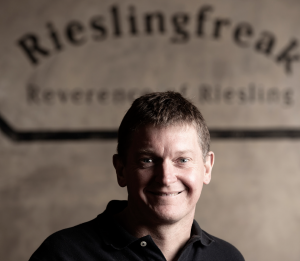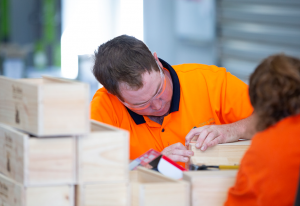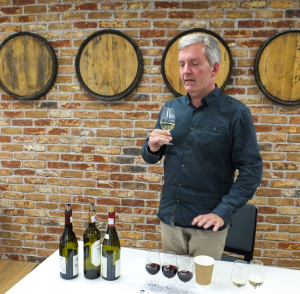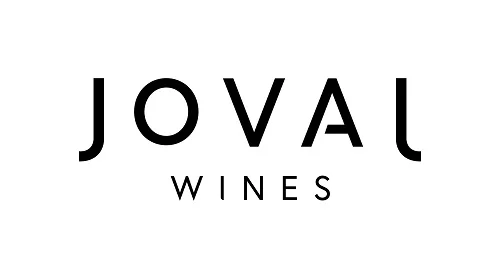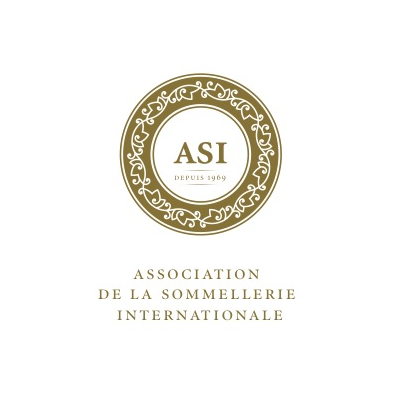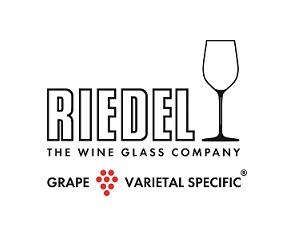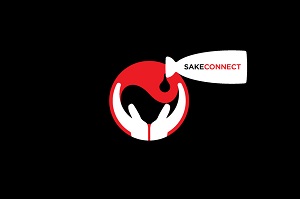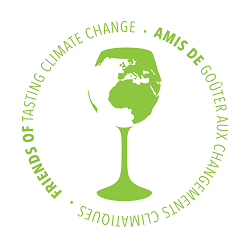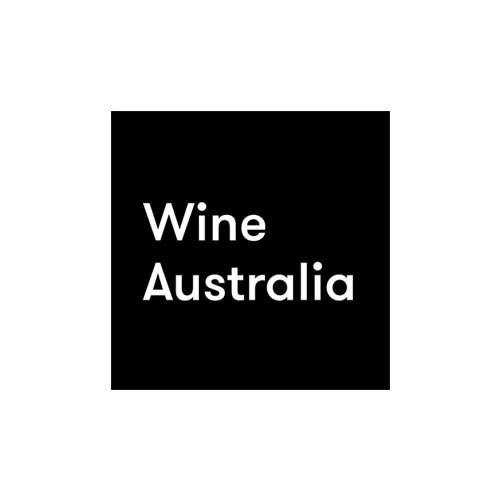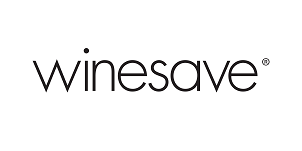While the wine and hospitality industries are starting to address the needs and working opportunities of the disabled, there’s still a way to go.
Written by Lisa Cardelli (Sommeliers Australia VIC Committee and D&I Working Group member), published on winecompanion.com.au, May 2022
John Hughes of Rieslingfreak makes one of Australia’s best rieslings – if not the best. John also has cerebral palsy that affects his speech and right hand. I wasn’t aware of this until he told me, which seemed to please the Barossa Valley winemaker. “I’ve never used my disability to sell a bottle of wine.”
“I will be honest,” he says, “I’ve applied for over 140 jobs, and we got to the interview stage, but no further.”
A chance to prove his competence and talent arrived when the Australian Wine Research Institute (AWRI) in Adelaide offered him a position with their analytical service in 1994.
He worked there for 10 years before his passion for viticulture and winemaking took him to Europe but, once back in Australia, it took more than 12 months to find a job. “In the end, the contacts I made through the AWRI got me my niche jobs in the wine industry,” says John.
His experiences finding work and being accepted in the wine industry with his disability led him to establish the Kicking Goals scholarship through Foundation Barossa, a community-based philanthropic foundation where John is a board member. “We provide mentorship for students with disabilities going through the last two years of high school,” he says. “The money goes towards tertiary education or needs, such as a computer or transport.”
John is also a board member of Barossa Enterprises, the largest employer of people with disabilities in regional South Australia. Its core business is the manufacture of timber wine boxes and packaging services for wineries.
The group started 45 years ago in response to a lack of government resources and structure around disability support.
Wine producers such as Henschke, St. Hallett, Jim Barry and Langmeil have been using its services for years. “It’s not charity we ask for,” says Barossa Enterprises CEO Garry Velt. “We ask for the work and what the [wineries] get in return is a quality product.”
Expansion for the group through the National Disability Insurance Scheme (NDIS) has seen it grow from a base in the Clare and Barossa Valleys to work in McLaren Vale. “We’re targeting the major communities within the winemaking districts in South Australia,” adds Gary. “But that’s not to say that we can’t expand to the Riverland, even over to the Hunter.”
While small groups like Barossa Enterprises are actively pursuing a more diverse workforce, less is happening on the national wine scene. When asked if Australian Grape and Wine Inc. had any plans or initiatives to encourage the participation and employment of disabled people in the Australian wine industry, CEO Tony Battaglene said he was not aware of any programs in place. “But it’s a good idea,” he adds. “We have no commitments but will look into it.”
Although disability seems to be more accepted in some sectors of the wine industry, it’s still a novelty in the hospitality industry.
Mirko Pastorelli, a wheelchair-bound Italian sommelier born with spastic diplegia, however, is helping to change perception.
When Mirko, fed up with the lack of jobs and opportunities for disabled people in the sector, shared his bio on the Association de la Sommellerie (ASI) website in 2019, he was offered a job at one of the most celebrated restaurants in Australia, Melbourne’s Vue de Monde.
He arrived in March 2020. A week later, Melbourne entered the first of many lockdowns due to Covid-19.
Although brief, Mirko’s experience on the floor at Vue de Monde is still vivid in his mind: “I was very nervous and excited at the same time, trying to look customers in the eyes, smiling and asking if they needed any advice,” he says from Italy, where he returned to live in October 2020. “After the first few minutes, I found myself at ease and everything turned out to be simpler. I tried to move as much as possible in the room to become familiar with that environment.”
He worked in a wheelchair with the help of a special service tray that allowed him to decant and pour wine. “The obstacle in many restaurants is that there isn’t enough space between the tables to be able to pass. At Vue de Monde, they offered me maximum support.” Customer reactions were “incredibly positive. Some were interested in my personal story, others wanted to take pictures with me, promising to come back to see me very soon.”
“I believe that the great strength of my physical condition is to stimulate curiosity in customers. In this way many psychological barriers are broken down.”
The hospitality industry worldwide is starting to address the needs and working opportunities of the disabled.
In 2021, Sommeliers Australia founded a diversity and inclusion working group which includes prominent wine professionals and medical academics. Its first online event covered topics such as flexible working environments and workplace behaviour.
Internationally, the UK-based Wine & Spirit Education Trust (WSET), which provides a globally recognised qualification in wine, spirits and sake, has a well-defined mission.
“Accessibility is key to everything we do,” said Carolyn D’Aguilar, WSET’s marketing director.
“All our course providers around the world are required to have policies enabling reasonable adjustments for candidates with special needs or disabilities. This reduces the effect of difficulty that places the candidate at a substantial disadvantage in the assessment situation.”
Carolyn added that the story of Richard Lane, a blind WSET student turned wine educator, is particularly important to highlight.
Richard enrolled in WSET courses in London, achieving the coveted diploma last year with a staggering merit. This allowed him to access the educator program and to qualify as such.
He said that his success was possible thanks to access to electronic course materials: PDF documents were turned into text that could then easily be read through software that provides speech and Braille output to a special computer known as JAWS – Job Access with Speech.
When it came to the visual examination of wine, WSET provided some verbal information to assist him with the basic colour of the wines assessed.
Currently teaching levels 1 and 2, he’ll progress to teaching level 3 and some diploma sessions. “WSET session plan notes are in my ear (via JAWS), so I know the slides and what information is contained on those.” He also has a tactile tasting mat so he can easily locate the wines per session.
Via Access To Work, a government employment scheme to help disabled employees, Richard received a grant to employ a support worker who helps guide him around the building and with the job routine.
When asked if the British wine industry is generally supportive and inclusive of disabled professionals, Richard says that he is not aware of any positive examples like his. “The industry needs to do more to be inclusive,” he says. “There are various [industry] initiatives promoting gender and ethnicity equality, though I
am not sure that awareness or advocacy for disabled people is as strong.”
Although things have started to positively change for disabled wine professionals, we’re still in the early days of full accessibility and acceptance.
